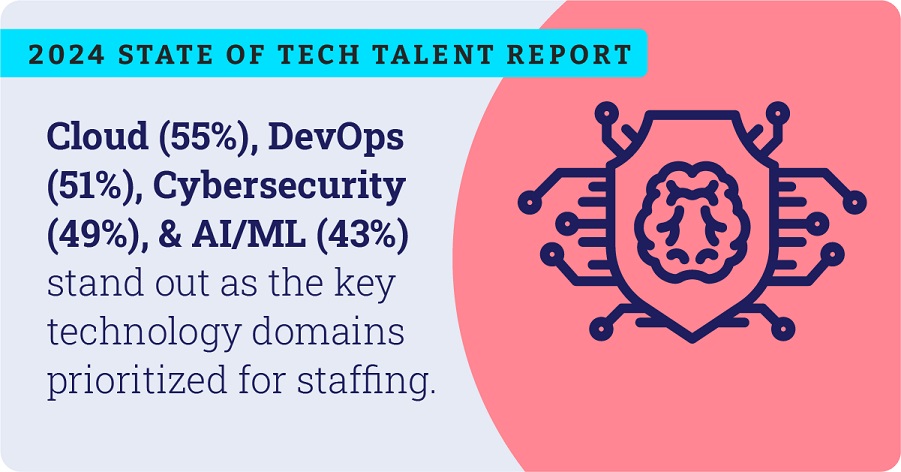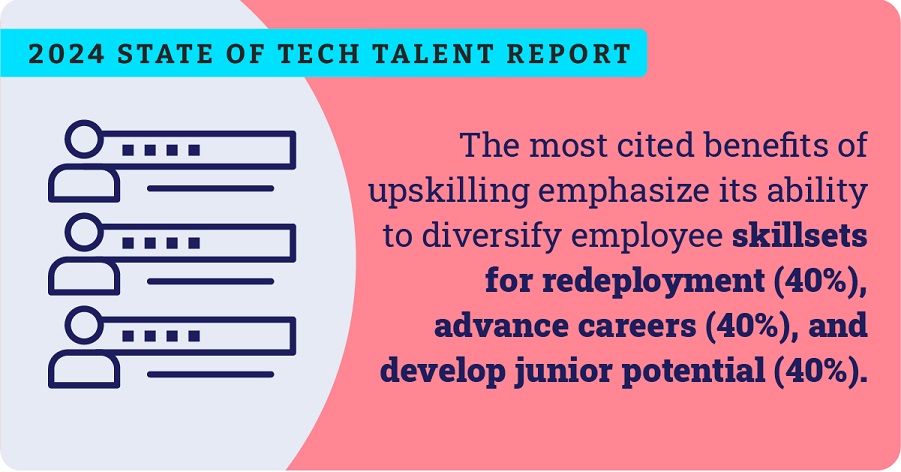Check Point® Software Technologies Ltd.(link is external) announced that it has ranked as a Leader and the only Outperformer for its Check Point Quantum(link is external) Security Solutions in GigaOm’s latest Radar for Enterprise Firewall report(link is external).
As we all watch the technology industry shift to the latest technologies, languages, hardware, and more, the good news for DevOps professionals is that DevOps continues to be a top priority for organizations. As they forecast the talent needs, 51% of organizations have dedicated technical talent allocated to DevOps. It ranks as the second-highest priority after cloud services (55%). The other top skills are cybersecurity (49%), and AI/ML (43%).

These are just some of the findings in the 2024 State of Tech Talent Report(link is external) from Linux Foundation Training & Certification. The report offers insight into the current landscape of technical talent acquisition, retention, and management, and it reveals some striking findings about how companies are prioritizing, developing, and hiring tech talent.
Skills-Based Hiring Outpaces Degrees
Traditionally, the tech industry placed a high value on academic degrees. However, as the pace of technological change accelerates, the skills required to succeed in this field are evolving rapidly. The report reveals a notable trend: certifications are now ranked higher than college or university degrees (23% to 16%) when assessing technical skills. This shift underscores the growing recognition that practical skills and hands-on experience are becoming increasingly crucial in the tech workforce.
The move towards skills-based hiring is a response to the pragmatic needs of the industry. Hiring managers are increasingly prioritizing candidates with tangible skills and certifications directly applicable to the projects and technologies at hand. This approach opens up opportunities for a wider pool of talent, including those who may have taken non-traditional paths to acquire their skills.
Upskilling and Cross-Skilling Take Center Stage
Related to that, the report also highlights the critical role of upskilling in today's tech industry. An overwhelming 98% of organizations consider upskilling a crucial strategy, with 36% rating it as extremely important. And across all technology domains, on average, 48% of organizations would prioritize upskilling or cross-skilling existing staff over hiring new employees or engaging consultants in 2024. This emphasis on continuous learning is not just about individual career growth; it is a strategic imperative for organizations looking to stay competitive.
By prioritizing upskilling and cross-skilling initiatives, companies can cultivate a versatile and adaptable workforce ready to tackle the challenges of emerging technologies. It is much like applying DevOps practices to staff development — being agile with iterative learning and adaptation and continuously updating your skills.

Seizing the Opportunities
While the shift towards skills-based hiring and upskilling presents exciting opportunities, it also comes with challenges. Perhaps your organization fosters an environment that nurtures continuous learning, or you might need to take the initiative yourself. As you look at upskilling or cross-skilling, you will find a litany of programs to choose from. Consider training and certification programs that are offered by established organizations and supported by the companies doing a bulk of the hiring. That will ensure a quality program that is recognized by hiring managers.
If you manage or influence an organization's staff development, recognize the immense potential that lies within this new talent landscape. As professionals commit to continuous learning and acquiring in-demand skills, they open up a world of opportunities for career growth and innovation. As organizations embrace skills-based hiring and invest in their employees' development, they build a strong and resilient workforce and also position themselves at the forefront of the digital revolution.
Charting the Path Forward
As we look to the future, one thing is clear: the tech industry's approach to talent is undergoing a profound transformation. Yesterday's methods won't train tomorrow's workforce. By embracing skills-based hiring, prioritizing continuous learning, and investing in the development of our workforce, we can unlock the full potential of our human capital and shape a brighter, more inclusive future for the technology sector, within DevOps and beyond.
Industry News
Postman announced new releases designed to help organizations build APIs faster, more securely, and with less friction.
SnapLogic announced AgentCreator 3.0, an evolution in agentic AI technology that eliminates the complexity of enterprise AI adoption.
GitLab announced the general availability of GitLab Duo with Amazon Q.
Perforce Software and Liquibase announced a strategic partnership to enhance secure and compliant database change management for DevOps teams.
Spacelift announced the launch of Saturnhead AI — an enterprise-grade AI assistant that slashes DevOps troubleshooting time by transforming complex infrastructure logs into clear, actionable explanations.
CodeSecure and FOSSA announced a strategic partnership and native product integration that enables organizations to eliminate security blindspots associated with both third party and open source code.
Bauplan, a Python-first serverless data platform that transforms complex infrastructure processes into a few lines of code over data lakes, announced its launch with $7.5 million in seed funding.
Perforce Software announced the launch of the Kafka Service Bundle, a new offering that provides enterprises with managed open source Apache Kafka at a fraction of the cost of traditional managed providers.
LambdaTest announced the launch of the HyperExecute MCP Server, an enhancement to its AI-native test orchestration platform, HyperExecute.
Cloudflare announced Workers VPC and Workers VPC Private Link, new solutions that enable developers to build secure, global cross-cloud applications on Cloudflare Workers.
Nutrient announced a significant expansion of its cloud-based services, as well as a series of updates to its SDK products, aimed at enhancing the developer experience by allowing developers to build, scale, and innovate with less friction.
Check Point® Software Technologies Ltd.(link is external) announced that its Infinity Platform has been named the top-ranked AI-powered cyber security platform in the 2025 Miercom Assessment.
Orca Security announced the Orca Bitbucket App, a cloud-native seamless integration for scanning Bitbucket Repositories.
The Live API for Gemini models is now in Preview, enabling developers to start building and testing more robust, scalable applications with significantly higher rate limits.




